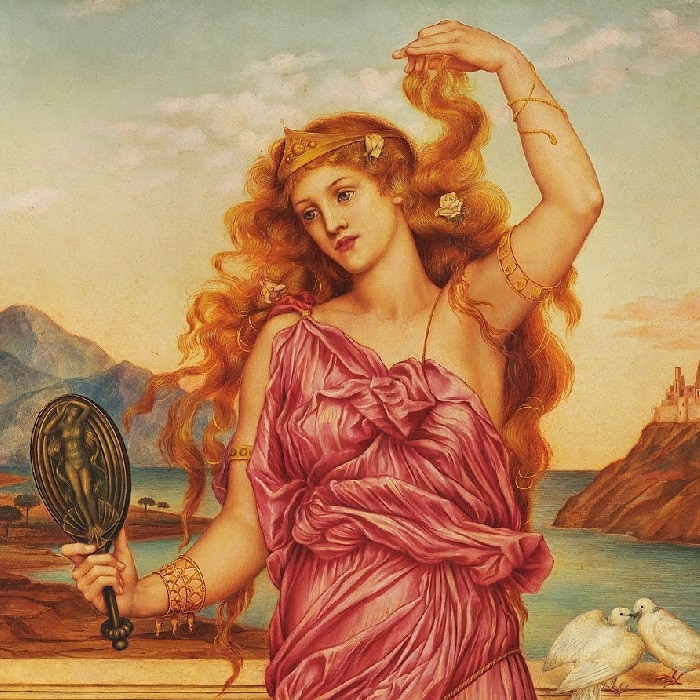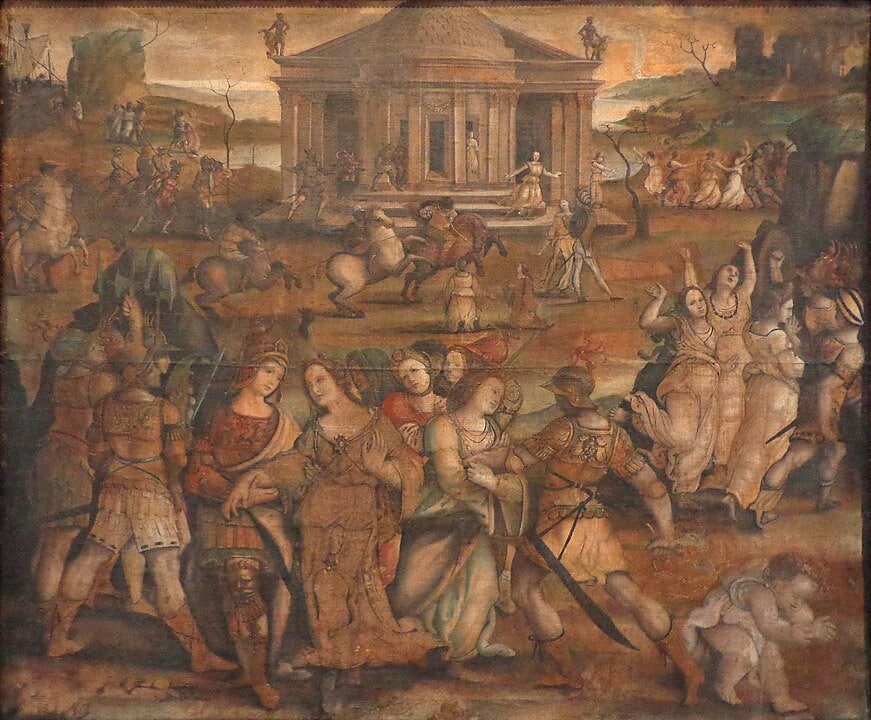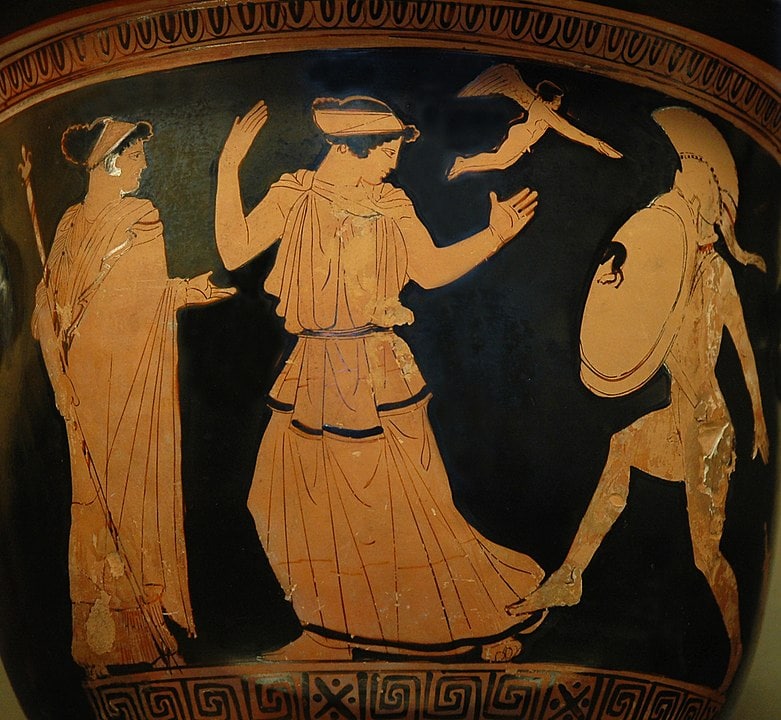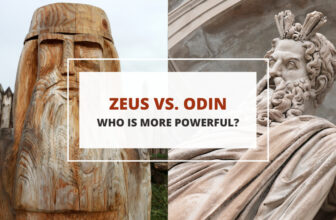
Table of Contents
In Greek mythology, Helen was the most beautiful woman on earth. Her beauty was such that it would cause Ancient Greece’s best-known conflict. She is known for having ‘the face that launched a thousand ships’. However, Helen was more than just a beautiful woman and only focusing on her beauty takes away from her role in Greek mythology.
Here’s a closer look at her story.
Who was Helen?

Helen was the daughter of Zeus, the king of the gods, and Queen Leda of Sparta. According to the myths, Zeus appeared to Leda in the form of a beautiful swan to mate with her. That same night, Leda laid in bed with her husband, King Tyndareus of Sparta. From both intercourses, Leda had two daughters and two sons: Clytemnestra, Helen, Pollux, and Castor.
Helen and Pollux were the offspring of Zeus, while Clytemnestra and Castor were those of King Tyndareus. In some accounts, the children were not born traditionally, but they emerged from eggs. The two boys were the Dioscuri, the protectors of the sailors and the spirits who helped the shipwrecked.
In other myths, Helen was the daughter of Zeus and Nemesis, the goddess of vengeance, and Leda was just her adoptive mother. Either way, Helen became known for her stunning beauty. She was bound to become the most beautiful woman on earth, and she amazed everybody with her appearance since her early childhood.
Helen’s First Abduction
When Helen was still a child, Theseus abducted her from Sparta. The Athenian hero believed that he deserved a daughter of Zeus as his wife, and, after hearing the tales about the beauty of Helen, he visited Sparta to take her. When Castor and Pollux realized Theseus had kidnapped Helen, they went to Athens to rescue their sister.

When these two brothers of Helen, known as the Dioscuri, arrived at Athens, Theseus was away, trapped in the underworld during one of his adventures. Castor and Pollux were able to take Helen with them without much hassle. In other stories, the brothers went to Athens with a full army to recover the beautiful Helen.
Helen’s Suitors
Helen returned to Sparta, where she lived in ease until she came of age. King Tyndareus started looking for suitors to marry her, so he sent emissaries to all Greece. The winner of Helen’s hand would be a lucky and happy man, for he would marry the most beautiful woman in all Greece. The losers, however, would end up enraged, and the possibility of bloodshed would be imminent.
For this, her father King Tyndareus devised a plan in which all the suitors had to abide by an oath. The oath bound each one of the suitors to accept the winner of Helen’s hand and protect the union if anybody abducted her or challenged the winner’s right to marry her. With this on the table, Tyndareus allowed Helen to select her husband from all the suitors.
Helen chose Menelaus, who together with his brother, Agamemnon, had lived their youth in the court of King Tyndareus after their cousin, Aegisthus, exiled them from Mycenae. All the other suitors accepted him as the winner. The oath was essential for the events that were to follow in the War of Troy, since Menelaus called out to all the suitors for help. All the suitors were great Greek kings and warriors, and after Prince Paris of Troy abducted Helen, Menelaus waged war on Troy with their support.
Helen and Paris
In some myths, Paris arrived in Sparta as the prince of Troy, and people received him with the highest honors without knowing his ulterior motives. In other stories, he appeared in disguise to court Helen. Menelaus was not in Sparta at the time, and Paris was able to abduct Helen without much issue.
The stories about the nature of Helen’s abduction also vary. In some accounts, Paris took Helen by force, as she did not want to leave. Many western paintings depict this as the ‘rape’ of Helen, showing her being carried away by force.

According to other sources, however, Helen fell for Paris under Aphrodite’s influence. In Ovid’s writings, Helen gave Paris a letter saying that she would have chosen him if he had been one of her suitors. Either way, Helen left Sparta with Paris, and this event sparked the famous conflict known as the Trojan War.
Helen and the War of Troy
Helen’s role in the Trojan War went beyond than just causing the conflict in the beginning.
The Beginning of the War
Upon arriving in Troy, people knew that Helen’s abduction would cause problems. However, there were no intentions to send her back to her husband. Helen and Paris married, and she became Helen of Troy. When Menelaus realized what had happened, he called for all of Helen’s oathbound suitors to join him to fight the Trojans and bring Helen back. This was a slight on his honor and he wanted to make the Trojans pay for their audacity.
Helen was not the most popular figure inside the protective walls of Troy. People saw her as a foreigner who had brought war to their prosperous city. Despite the Greeks’ request for them to return Helen to Menelaus, they kept her in Troy. The war would last about ten years and would cause much devastation.
Helen Remarries
Among the many casualties of the war, Prince Paris of Troy met death at the hand of Philoctetes. After Paris’ death, Helen had no say when King Priam of Troy remarried her to his son, Prince Deiphobus. In some stories, Helen would betray Deiphobus and finally help the Greeks win the war.
Helen and the Fall of Troy
Helen discovered the hero Odysseus in one of his incursions to the city to steal the Palladium, on which the safety of Troy depended, following a prophecy about Greek victory. Yet, she did not expose him and remained silent. When the city of Troy fell thanks to the Greeks’ Trojan Horse, some myths state that Helen knew about the strategy but did not tell the Trojans about it. Lastly, some stories say that she informed the Greek army when to attack, using torches from her balcony. It could be that Helen had turned against the Trojans because of how they had treated her since the death of Paris.
Helen Returns to Sparta
Some myths say that Menelaus intended to kill Helen for her betrayal, but, with her staggering beauty, she convinced him not to do so. After the war, Helen returns to Sparta as Menelaus’ wife. There are depictions of Helen and Menelaus in their palace receiving Telemachus, Odysseus’ son, as he visits the happy rulers of Sparta. Helen and Menelaus had one daughter, Hermione, who would marry Orestes, Agamemnon’s son.

What Does Helen Symbolize?
Since ancient times, Helen has symbolized the ultimate in beauty and the personification of ideal beauty. In fact, Aphrodite, the goddess of love and beauty, names Helen as the most beautiful woman in the world.
Helen has inspired numerous works of art, many of which depict her in the act of running away with Paris.

Facts About Helen
Helen’s father is Zeus and her mother the mortal queen Leda.
Helen marries Menelaus but is later abducted by Paris.
Helen and Menelaus have one child, Hermione.
Helen’s beauty was such that she was the reason for the Trojan War, one of the most famous and bloodiest of ancient Greek conflicts.
Helen was a demi-god, as her father was Zeus. However, a cult that worshipped her later developed.
In Brief
Helen and her beauty were the foremost cause of Ancient Greece’s most famous conflict and the demise of the great city of Troy, even though she herself had little agency in what happened. Her story was the beginning of a variety of myths from various poets of antiquity. She was an influential figure in Greek mythology.








